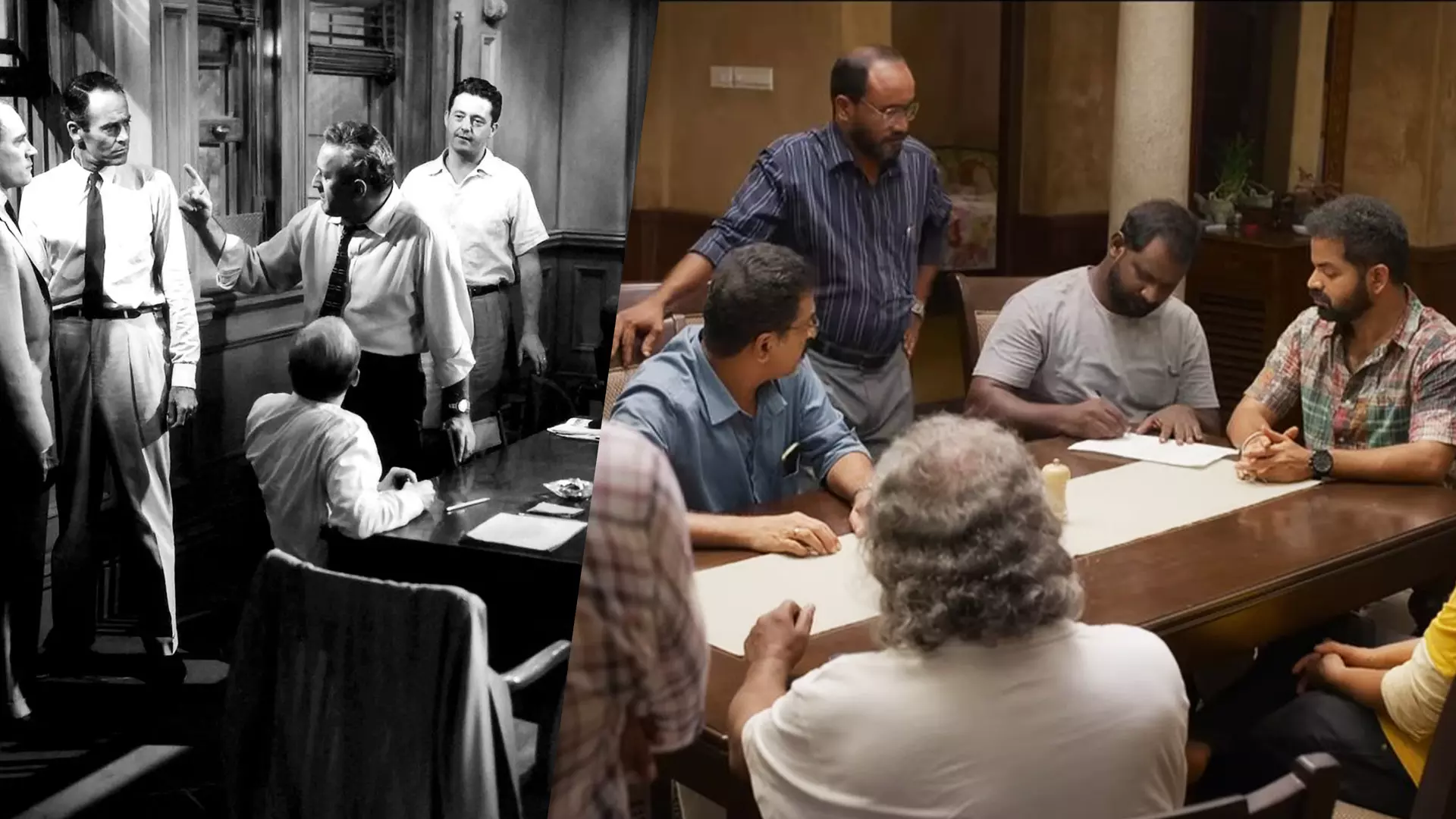
Aattam dissects mansplaining, redefines feminist approach in Malayalam cinema
The film scrutinises the pervasive insensitivity of a patriarchal society in the face of a sexual assault of a woman in a space she held secure

In Malayalam, Aattam can be translated broadly to encompass play, dance, act, visual performance, or sway. In Anand Ekarshi’s magnificently crafted film, it embodies a singular and diverse significance. The movie unfolds against the backdrop of an amateur theatre group and one of their performances.
The film’s central narrative, is the harrowing experience of Anjali, the lead actress of the group and an architect by profession, encountering sexual assault within a space she always deemed secure. The major part of the film delves into the dynamics of a collective of men who convene to discuss about the matter rather than letting her to decide on the future course.
Unmasking layers of male hypocrisy, the movie scrutinises the pervasive insensitivity of a patriarchal society to such cases. The dynamics surrounding Anjali's experience and the team's response are shaped by intricate interplays of power and gender relationships.
Mansplaining, manterrupting, manologues
All 12 male members of the troupe, who were present on the night when Anjali was subjected to inappropriate touching through a window by one of them (initially suspected to be the lead actor, Hari, who is also an upcoming film star), participate in discussions to determine how to address the incident.
Initially, with Hari as a suspect, the team becomes divided between his supporters and detractors. However, in the second half, the dynamics shift, and the team largely unanimously leans towards urging Anjali to compromise. As the incident unfolds further, suspicions grow, and all members of the troupe become potential suspects leaving her with no other option but to quit the group.
The discussion sequences, comprising more than a significant portion of the film, unequivocally fall into the realms of mansplaining, manterrupting, and manologues.
This dynamic involves men, including Vinay (her romantic partner), Madan (a mentor-like member of the group), and Aji Chettan and Selvan Chettan (two elderly members who presume to know more than her), dominating the discourse.
A once intimate and cherished space, where Anjali felt free to express herself without inhibition – whether through casual drinking with friends or discreet physical intimacy with her romantic partner – suddenly transforms into a source of insecurity.
The people she considers her closest allies and confidants become, to her dismay, both judge and jury. Summoned to a meeting space, she wants to avoid only one man, Hari, whom she believes had groped her. However, as she departs, all 12 of her comrades, including her lover, find themselves categorised among those she never wants to confront again in her life.
Portrayal of alienation
The portrayal of the alienation experienced by a survivor of sexual harassment in Aattam is masterfully subtle, a testament to Ekarshi's exceptional skills in both writing and execution.
In a way, Anand Ekarshi’s Aattam evokes memories of Sidney Lumet’s 1957 classic 12 Angry Men, as both films predominantly revolve around the dialogues of men.
The notable difference lies in the absence of a clear verdict towards the conclusion of Aattam. While the plots diverge, the connection emerges from the setting of a jury, a casual one in Ekarshi’s film as opposed to the legal one in the American film.
12 Angry Men delves into the deliberations of a 12-member jury regarding a crime allegedly committed by a teenager. In contrast, Aattam involves a crime within a 13-member theatre group, leaving us uncertain beyond a reasonable doubt about the perpetrator. Towards the end, anyone could be the culprit, adding a layer of mystery to the narrative.
Hayavadana - a red herring
Another element of the film deserving careful scrutiny is the choice of the play performed by the troupe, Arangu.
They staged Girish Karnad's monumental play, Hayavadana, with an interpretation that cast Kapila as the protagonist. It was clear that Hari played Kapila, Vinay portrayed Devadutta, and Anjali took on the role of Padmini. Despite Karnad's Hayavadana assigning equal importance to Kapila and Devadutta (along with the horse-faced character, Hayavadana), Arangu's rendition positions Devadutta as a secondary character.
Hayavadana narrates the story of two friends, forming a triangular love tale as they both fall in love with the same woman, who inadvertently exchanges heads with another. Initially appearing as a comedy, the play concludes tragically with the deaths of the two friends and their beloved. The narrative also explores the story of a man with a horse's head seeking humanity. In essence, the play delves into the theme of a woman's need and desire for both intellectual prowess and physical strength.
Despite having three characters in Hari, Vinay, and Anjali that could easily parallel the roles in Hayavadana, writer-director Ekarshi resisted the straightforward route, avoiding the temptation that many writers might succumb to. He maintained clarity in his intended message and demonstrated cleverness by using Hayavadana as a red herring.
Subtle political film
The play is subtly woven into the background, presented in a kind of loop, within the suspenseful and thriller-like unfolding mystery of the film.
The brilliant performances from all the actors who are all part of an amateur theatre initiatives around Ernakulam have contributed immensely to the success of the film. Apart from the mainstream actors, Kalabahavan Shajon as Hari, Vinay Fort as Vinay and Zarin Shihab as Anjali, Madan Babu as Madan, the senior member of the troupe is the pick of the actors.
The film's original dialogues and the nuanced exploration of complex gender politics make it one of the most subtly political films of recent times. In the ongoing context of a Malayalam film actress battling a sexual assault case from an intimate space, with a prominent actor in the dock, Aattam gains an added layer of political relevance as well.

